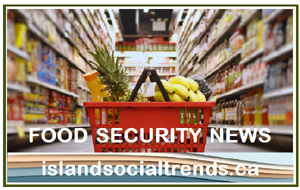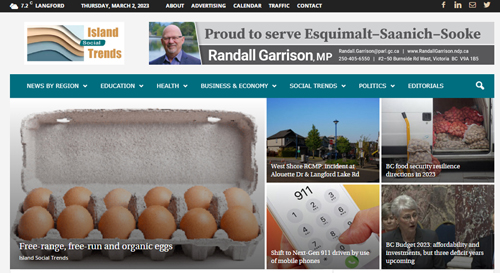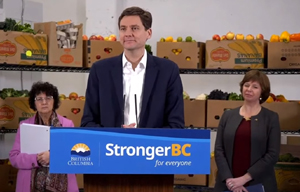
Tuesday March 7, 2023 | LANGFORD, BC
by Mary P Brooke | Island Social Trends
A few more details on BC’s investment in strengthening food security across the province were unveiled today by Premier David Eby, along with a $200 million funding announcement “to ensure people have better access to an increased supply of affordable, local food”.
That’s up from the $160 million shown for Food Security Initiatives through surplus spending (‘supplementary estimates’) in Budget 2023 that was released February 28.
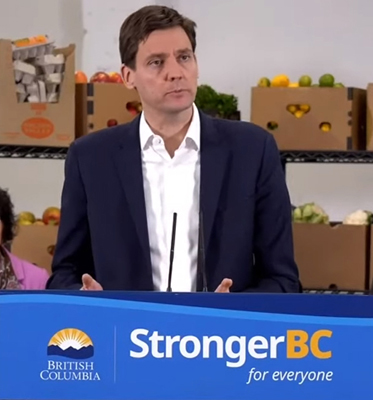
Today’s announcement was made at The Food Stash Warehouse on East 1st Avenue in Vancouver, with a creative backdrop of boxes of produce as well as supplies like egg cartons.
“Nutritious, available, affordable food is important for British Columbians,” said Premier Eby in his opening remarks today.
Premier David Eby was joined by Pam Alexis, Minister of Agriculture and Food; and Sheila Malcolmson, Minister of Social Development and Poverty Reduction, for details on the investment in building food security in British Columbia.
New awareness across BC:
Today Eby said that a few years ago food security would probably not have been on people’s radar much. But awareness has changed as people have seen and experienced food supply chain interruptions (during the pandemic in 2020/2021 and the Fraser Valley flooding in November 2021) and a rapidly increasing cost of food due to inflation (driven by global economic factors as well as extreme weather events).
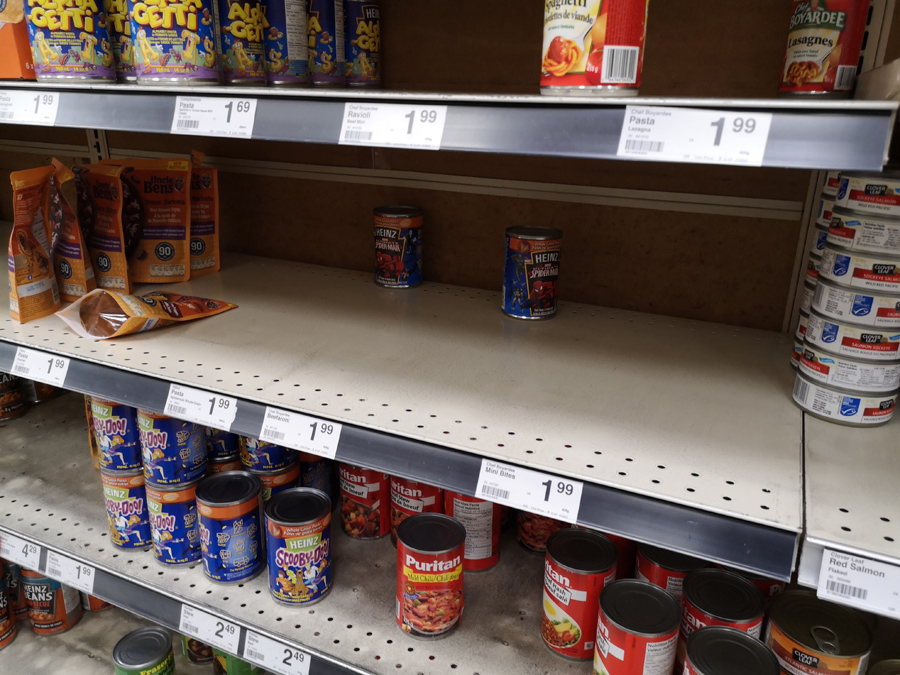
“Food security in British Columbia requires an available, affordable and uninterrupted supply of nutritious food,” said Premier David Eby.
“At the same time, we need targeted, effective programs that support the people and communities most impacted by rising inflation, climate events and supply chain shocks.”
Another aware of new awareness is how poverty is that systemic change is needed for getting to the root causes of poverty, said Dan Huang Taylor, executive director, Food Banks BC today.
“Children go hungry through no fault of their own,” said Michael McKnight, CEO, United Way BC, as part of today’s announcement.
Sheila Malcolmson, Minister of Social Development and Poverty Reduction spoke briefly today about food security initiatives simply being the right thing to do.
Broad range of initiatives:
Here is the outline about Food Security Initiatives (from the Budget 2023 documentation):
- Funding for food security initiatives will support British Columbians access an affordable supply of nutritious food.
- Through a series of targeted initiatives, the Province says it will strengthen the food supply chain across BC including local and regional food systems.
- This includes direct food support to underserved people and communities through trusted community partners such as Food Banks BC and the United Way.
- Dedicated funding will increase the availability of fresh food in Indigenous communities, increase food processing capacity in BC, and support the development of new and expanded local food production businesses.
- Funding will also improve the resilience of BC food supply by identifying and mitigating the effects of climate change and the increasing intensity of climate events.
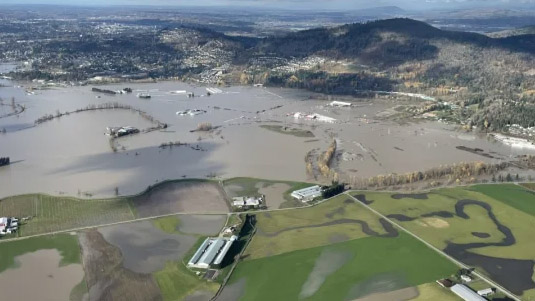
Range of major initiatives:
A wide range of major initiatives will be funded out of the $200 million announced today, including:
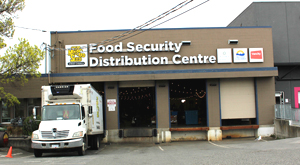
- Indigenous Food Affordability and Food Security – Will increase Indigenous food security, sovereignty and economic development while decreasing food costs for rural and remote Indigenous Peoples.
- Food Security Emergency Planning and Preparedness – Will allow agricultural producers, industry associations and Indigenous communities to develop disaster plans, mitigation strategies and projects with a unique focus on food security and agricultural resiliency.
- Flood Mitigation for Fraser Valley Farmers – Will provide funding for flood mitigation projects for agricultural producers most affected by the 2021 floods with an emphasis on solutions that provide both flood mitigation and habitat restoration.
- Food Processing Growth – Will address critical gaps in B.C.’s food processing sector to increase food production, food security, and economic growth.
- Food Affordability and Innovation – Will help lower British Columbian’s grocery bills by fostering innovation and improving productivity.
- Critical Food Security Infrastructure – Will improve food security infrastructure throughout the province. Examples include larger commercial-grade coolers, new or improved warehouse facilities, and new or upgraded vehicles for collection, warehouse management and distribution of food.
- Food Banks BC – Will support food access programming, crisis response and work toward long term food security outcomes.
- United Way BC – Will support expansion of regional community food hub programming, including new hubs in northern B.C. and southern Vancouver Island, and support co-ordination of effective community food access responses through an advisory committee.
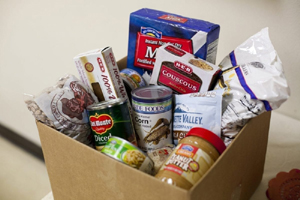
Enhancements for food supply chains and local food production:
The Ministry of Agriculture and Food will invest in new and enhanced programs to strengthen B.C.’s food supply chain and expand local food production from producers to processors and from packers to retailers.
The ministry will also be investing in Indigenous communities to help with the availability and cost of food and to improve local food security, particularly in remote and rural communities.
The funding will also help agricultural producers and food processors grow their businesses and become more resilient to the impacts of climate change and extreme weather events.
“This historic investment will give British Columbians access to more nutritious, local and affordable food while maintaining agriculture as a key economic driver in B.C.” said Pam Alexis, Minister of Agriculture and Food. “This funding will help strengthen our food supply chain, increase food security in our communities, and improve our resilience in the face of a changing climate.”
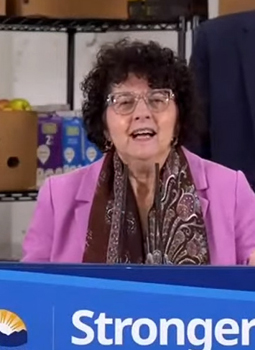
Additionally, grants from the Ministry of Social Development and Poverty Reduction will strengthen food banks, food distribution and food access. This includes providing food to under-served communities through trusted partners, such as FoodBanks BC and the United Way, as well as increasing the availability of fresh food in rural, Northern and Indigenous communities.
“Global inflation has hit people hard and the rising cost of food is especially tough on vulnerable people,” said Sheila Malcolmson, Minister of Social Development and Poverty Reduction. “Helping people lead full, dignified lives is the right thing to do, and funding will help thousands of people access nutritious, affordable food.”
An exploration of how much the grocery store sector has intentionally pushed up prices as a way to profit during an upward inflationary cycle will be taking place in Ottawa tomorrow, when the CEOs of three large grocery chains will appear March 8 before the House of Commons Agriculture and AgriFood Committee. Local MP Alistair MacGregor (Cowichan-Malahat-Langford) is on that committee.

Impacts of COVID, inflation, climate emergencies:
Food insecurity has increased because of COVID-19, inflation, supply-chain issues, and climate emergencies that interrupt the food supply as well as production, said Premier Eby today.
“This unprecedented investment recognizes the diverse challenges of food producers, processors, suppliers, retailers and consumers, strengthening food security for everyone,” it was stated in a news release that followed the announcement.
Vancouver Island resilience & challenges:
It has been well known for decades that on Vancouver Island only about three percent of the food consumed is grown locally. Food resilience on Vancouver Island was a focus during the 2021 federal election within the Esquimalt-Saanich-Sooke riding.
In the event of a major emergency that significantly interrupts food supply chains through the disruption of highways, ferries or air service, islanders would soon be pretty much stranded. Local and regional organization around food supply resilience is an obvious situation to improve.
The aspect of food security directly to children in BC schools was promoted by Finance Minister Katrine Conroy at an SD62 elementary school in Langford last week, the day ahead of her presentation of Budget 2023 in which she said that children don’t learn well on an empty stomach. Even Langford city council heard during a presentation last night (by the Regional Household Affordability & Prosperity Project) that 21% of people in Greater Victoria who seek one-time support to afford their rent are in the fast-growing Langford. If people can’t pay rent they are very likely also in need of food support.
Leading up to this announcement:
The Ministry of Agriculture and Food is headed up by Agriculture and Food Minister Pam Alexis, who took over that ministry just a few months ago (when Premier David Eby announced his new Cabinet on December 7, 2022).
A few weeks ago, House Leader Ravi Kahlon said the BC government would be coming out with a range of initiatives to support food sustainability. Kahlon had specifically mentioned the impacts of drought and wildfires in California as having an impact on food availability in BC. Today Premier Eby, in that context, said that growing more food in BC also has exciting export opportunities.
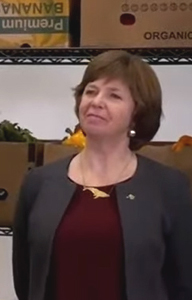
In October 2022 Ag Day was celebrated in Victoria, when farmers and ranchers could discuss food production issues with government, particularly rising food production costs, a process which helps achieve actionable outcomes.
Background quotes:
“As we feel the continued strains of inflation and supply-chain interruptions with our food system, there is no greater time to invest in our food system in British Columbia. For generations, we have provided consumers with quality trusted products and are a vital part of B.C.’s economy. It is imperative that we continue to ensure all British Columbians are nourished, and our food system thrive.” ~ James Donaldson, CEO, BC Food and Beverage
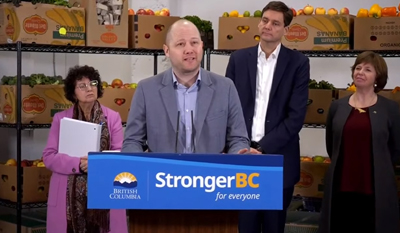
“B.C.’s farmers and ranchers recognize that the budget decisions made today affect their long-term economic success. The BC Agriculture Council thanks the government for its robust investment, and we look forward to the further details involved as food security and rising costs of food is at the forefront for all British Columbians.” ~ Stan Vander Waal, president, BC Agriculture Council
“No one should have to go to bed worrying about how they will get their next meal or feed their families. This funding will support the expansion of United Way BC’s 20 regional community food hubs, to include new hubs in northern B.C. and southern Vancouver Island, and will strengthen service delivery and support. We will work closely with local food banks, Indigenous organizations and communities, and other social service agencies to help our friends and neighbours in need.” ~ Michael McKnight, CEO, United Way BC
“With British Columbians turning to food banks in record numbers, the funding support from the Province could not have been better timed. Food Banks BC applauds the commitment to investing in food security initiatives that result in more healthy, local food getting to people in need. We look forward to continuing to work in collaboration with the Province and other key stakeholders as we collectively seek an end to hunger in B.C.” ~ Dan Huang Taylor, executive director, Food Banks BC
===== Government Links:
TogetherBC, B.C.’s poverty reduction strategy
===== RELATED ARTICLES by ISLAND SOCIAL TRENDS:
Egg production in BC (Mar 2, 2023)
BC food security resilience directions in 2023 (Mar 1, 2023)
BC Budget 2023: affordability and investments, but three deficit years upcoming (Feb 28, 2023)
BC food security direction includes watchful eye on California (Feb 6, 2023)
Economists see housing and risk-vs-uncertainty as key challenges in 2023 (Dec 6, 2022)
Food hub gains traction with suppliers, provides training, supports local farmers (Aug 8, 2022)
Elxn44 ESS candidates: food sustainability on Vancouver Island (Sept 12, 2021)
Food Security News by Island Social Trends (archive)
===== ABOUT ISLAND SOCIAL TRENDS:
Island Social Trends emerged in mid-2020 from a preceding series of publications by founder/editor Mary P Brooke and published by Brookeline Publishing House Inc, covering news of the Vancouver Island region, BC and national issues through a socioeconomic lens.
The publication series began with MapleLine Magazine (2008-2010), then morphed to a weekly print newspaper Sooke Voice News (2011-2013), and then into the weekly PDF/print West Shore Voice News (2014-2020). The news at IslandSocialTrends.ca (2020 to present) is entirely online.
Among many other qualifications, Mary Brooke holds a B.Sc. in Foods & Nutrition, as well as Certificate in Public Relations and an industry certificate in digital marketing. She reports with the BC Press Gallery.
ARCHIVES: POLITICS | HEALTH | EDUCATION | ECONOMY | FOOD SECURITY



